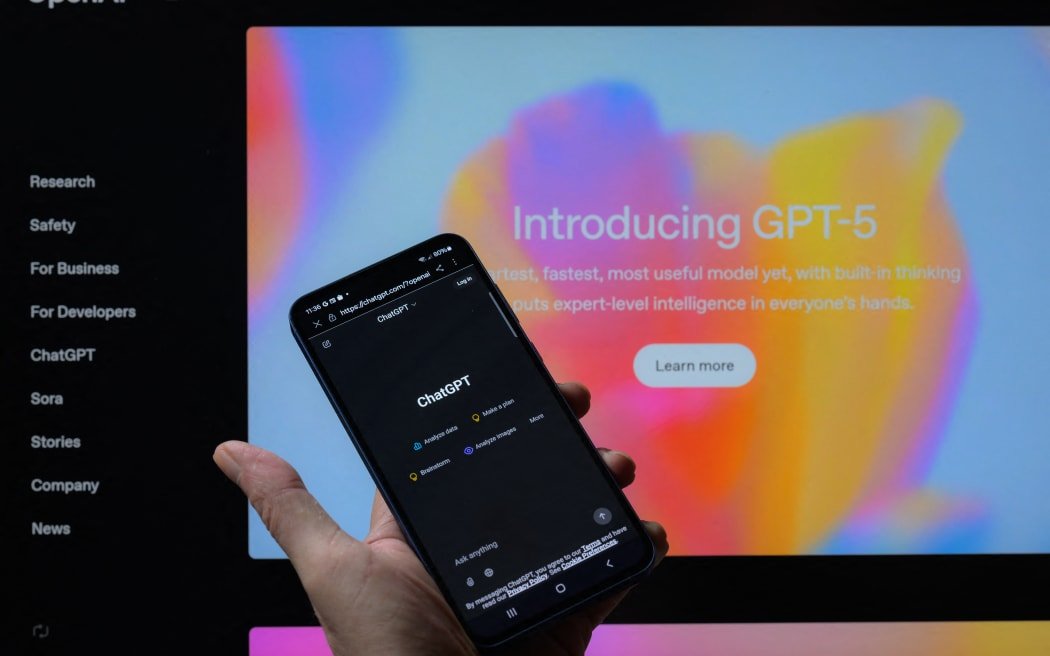Education
Professor calls for government to begin AI education earlier

The government has announced a number of new secondary school subjects for years 11 to 13.
Photo: AFP / JONATHAN RAA
A digital education professor has called on the government to be bolder with its plan to bring in artificial intelligence as a subject in schools.
The government has announced a number of new secondary school subjects for years 11 to 13, which will begin rolling out from 2028.
It included a new year 13 subject on Generative AI, but for later development.
Speaking to media announcing the new secondary school subjects, Education Minister Erica Stanford said there would be a new emphasis on artificial intelligence (AI).
“With the rapid development of AI, students will be able to learn about generative AI. This may include learning about how digital systems work, machine learning, cybersecurity, and digital ethics.
“I’ve asked the Ministry [of Education] to investigate a new specialised Year 13 subject on generative AI for later development.”
Education Minister Erica Stanford
Photo:
Canterbury University Associate Professor of Digital Education Kathryn MacCallum said children needed to start learning about AI before year 13.
“Why does it sit at year 13 and why aren’t we doing this a lot earlier. It misses the point that a lot of students and even younger are engaging with AI.
“If we’re leaving it to year 13 to engage with this, how does it set them up to using it appropriately?” she said.
MacCallum said if the government was going to focus on AI as a year 13 topic, it was too late.
“Looking at the refresh of the curriculum, we should be actually starting with an explicit engagement of AI from year 1, and we should be tailing this with digital literacy.
Professor Kathryn MacCullum
Photo: University of Canterbury
“So AI literacy to some degree sits as a separate subject or a separate focus, but it also needs to dovetail into being good citizens, and being able to be digitally literate, and supporting students to engage in a society that is so much more around digital.
“So I think we also have a responsibility to also be really focused on how do we get all students to be more engaged in the digital side and that’s not just coding, it needs to be about the broader spectrum of digital,” she said.
MacCallum also urged the government to be broad when it began developing the framework.
“I know that some of the commentary is about generative AI, but if we’re going to do it, we need to be very broad about what we’re trying to engage our students in and understanding that what AI is in its broad nature.
“We should be talking about how it works and not just the technology, so we shouldn’t be just saying, OK, [here is] AI technology, these [are the] tools, and how do we use it in this context.
“We should be explaining to the students and helping them understand where AI sits and equally, where it shouldn’t sit… that’s why we need to start early is because part of the process of navigating the space is knowing when AI should sit in the process, but equally when we shouldn’t be and how it’s manipulating us, but equally how it can be useful in certain spaces.”
MacCallum said she supported the government’s move to introduce AI into schools and wanted a framework in place as soon as possible.
Other school subjects announced on Thursday include mechanical engineering, building and construction, infrastructure engineering, civics, politics and philosophy, Pacific studies and primary industry.
Stanford said the new subjects reflected the growing importance of science, technology, engineering and maths.
RNZ has approached her office for more comment on Professor MacCallum’s views.
Concern over teacher numbers
Dr Nina Hood is a former secondary school teacher and founder of the Teachers Institute, which gives prospective in-school training but also upskills existing teachers too.
She told First Up she didn’t think there were currently enough specialist teachers to teach new subjects being introduced by the government.
She said some work would need to be done to build capacity across the teaching force to be able to offer the subjects.
That could involve bringing new people into the profession or partnering with industry.
Devaluation of outdoor education – principal
Mount Aspiring College principal Nicola Jacobson said high school students who were looking to continue on to university were being discouraged to study outdoor education under the new curriculum.
Outdoor education would lose its University Entrance & Academic status – becoming a vocational subject instead.
Jacobson said the move would narrow students’ academic focus and devalue the subjects that no longer counted towards University Entrance.
“What the government is proposing is very distinct lists between vocational and academic. Students might develop a perception around a pathway – or parents might develop a perception around a pathway – when we need people who are able to do all of those things and feel valued in the skills and knowledge that they have,” Jacobson said.
Jacobson said equally valuing all subjects under NCEA allowed a greater variety of skills and achievement to be reflected within the qualification.
Sign up for Ngā Pitopito Kōrero, a daily newsletter curated by our editors and delivered straight to your inbox every weekday.
Education
Daystar University and MindHYVE.ai Launch AI-Powered Higher Education Transformation in Kenya
NAIROBI, Kenya and NEWPORT BEACH, Calif, Sept. 11, 2025 /PRNewswire/ — Daystar University, one of Kenya’s premier private Christian liberal arts institutions, and MindHYVE.ai, Inc., a global innovator in artificial intelligence, have entered into a landmark partnership to embed ArthurAI™, MindHYVE’s agentic AI learning platform, across Daystar’s academic ecosystem.
This partnership positions Daystar as one of the first universities in East Africa to implement a comprehensive AI-powered learning environment at scale — directly addressing the needs of Kenya’s over 500,000 higher education students, many of whom face challenges of access, personalization, and outcomes.
ArthurAI by the Numbers: Transforming Learning and Teaching
ArthurAI has already demonstrated significant measurable impact in academic environments:
- 80% reduction in curriculum preparation time – allowing faculty to shift focus from administrative tasks to mentorship, research, and innovation.
- Adaptive learning pathways – dynamically tailoring coursework to each student’s cognitive profile, learning style, and pace.
- Predictive analytics for student success – enabling early identification of at-risk learners and targeted interventions that raise completion and retention rates.
- Multilingual delivery in 10+ languages – critical in Kenya’s diverse linguistic landscape, ensuring inclusivity and accessibility.
- Mobile-first and offline capability – extending Daystar’s reach beyond classrooms, supporting equitable access even in bandwidth-limited environments.
“ArthurAI will not only enhance our classrooms — it will redefine them,” said Professor Martha Kiarie, Dean of the School of Science, Engineering and Health at Daystar University. “By leveraging adaptive intelligence, we can ensure every student is supported according to their unique learning needs. This is how we prepare our graduates to thrive in an AI-enabled global economy.”
Bill Faruki, CEO & Founder of MindHYVE.ai, added:
“ArthurAI isn’t a theory — it’s a proven system already delivering measurable gains. Partnering with Daystar allows us to show how Africa’s universities can leapfrog legacy systems and lead the world in responsible, scalable AI education.”
The rollout begins this semester across selected departments and will progressively expand to reach Daystar’s entire academic community. Quarterly reviews will measure student engagement, faculty adoption, and institutional outcomes — ensuring continuous improvement and maximum impact.
About Daystar University
Daystar University is a private Christian liberal arts university with campuses in Nairobi and Athi River. Chartered in 1994, Daystar is known for shaping servant-leaders equipped to transform society through faith-driven excellence.
About MindHYVE.ai
MindHYVE.ai™ is redefining the boundaries of intelligence by engineering autonomous systems and deploying domain-specific AGI agents across real-world sectors. Powered by the Ava-Fusion™ large reasoning model and architected for agent coordination, swarm intelligence, and adaptive autonomy, MindHYVE’s technology stack is revolutionizing law, medicine, finance, education, and governance.
With operations in North America, Asia, and now soon in Africa, MindHYVE.ai™ is on a mission to democratize access to transformative intelligence and architect the infrastructure for post-scarcity economies. Backed by HYVE Labs, the company continues to shape the future of agentic systems on a global scale.
Website: www.mindhyve.ai | Email: [email protected] | Contact: +1 (949) 200-8668
Media Contacts
Marc Ortiz
Email: [email protected]
Photo – https://mma.prnewswire.com/media/2771408/MindHYVE_ai_x_Daystar.jpg
Logo – https://mma.prnewswire.com/media/2730797/MindHYVE_ai_Logo_MindHYVE_ai_SQ_Logo.jpg

Education
Oxford Union condemns president-elect’s reported comments on Charlie Kirk shooting | University of Oxford

The Oxford Union has “unequivocally” condemned comments apparently made by its president-elect about the fatal shooting of the rightwing activist Charlie Kirk in the US.
Kirk, 31, was killed at a Utah Valley University show on Wednesday in what authorities have called a political assassination.
George Abaraonye, who became president-elect of the debating society after a vote in June, posted comments in a WhatsApp group after his death, according to the Daily Telegraph.
One message was reported to have said “Charlie Kirk got shot, let’s fucking go”, while another thought to have been posted on Abaraonye’s Instagram account read “Charlie Kirk got shot loool”.
In a statement on Thursday, the Oxford Union criticised the student’s comments and said it “firmly opposes all forms of political violence and strongly stands by our commitment to free speech and considerate debate”.
“The Oxford Union would like to unequivocally condemn the reported words and sentiments expressed by its president-elect, George Abaraonye, with regards to the passing of Charlie Kirk,” the society wrote on X. “His reported views do not represent the Oxford Union’s current leadership or committee’s view.
“The current administration has, under president Moosa Harraj, no association with and is entirely independent from Mr Abaraonye’s administration.”
The statement added: “We would like to reiterate that our condolences lie with Charlie Kirk’s family, especially his wife and young children, who are enduring such terrible grief.”
Kirk and Abaraonye had met during a debate on toxic masculinity held by the Oxford Union in May, the Telegraph reported. Donald Trump, the US president, paid tribute to Kirk as a “martyr for truth and freedom” after the shooting.
Education
DVIDS – News – Lethality, innovation, and transformation though AI education at the U.S. Army School of Advanced Military Studies

THE ARMY UNIVERSITY, FORT LEAVENWORTH, Kansas – In late July 2025, the Advanced Military Studies Program at the School of Advanced Military Studies, known as SAMS, launched its first-ever experimental, three-day, Practical Application of Artificial Intelligence module.
The mission was simple: transform the program with an innovative, hands-on AI learning experience for students and faculty. The purpose was to enable warfighter lethality through AI education and training.
“AI is changing the character of warfare. Our graduates have got to be ready to lead formations powered by AI—and that’s why we did something about it,” Col. Dwight Domengeaux, Director, SAMS said.
Dr. Bruce Stanley, Director, AMSP, envisioned a module that pushed institutional norms about how mid-career officers learn about AI and learn with AI.
“Did we accept risk? Yes. We did—to create a critical learning opportunity for our students,” Stanley remarked. “We knew what was at stake, and we trusted our faculty and students to make it work.”
And make it work they did.
According to AMSP faculty, the module’s experimental instructional design was key, consisting of ten-and-a-half hours of total classroom contact time divided over three lessons.
“We covered a lot of ground with our students in three days,” Dr. Jacob Mauslein, associate professor, AMSP, said. “Subjects ranged from AI theory and ethical considerations of AI, to applying AI tools, and leading AI-enabled organizations.”
A novel feature of the module was that it was developed by AMSP students. As a task in their Future Operational Environment course, six students from the Class of 2025, mentored by two faculty, developed the AI module that would be taught to the Class of 2026. The students’ final draft was adopted almost without change by the faculty.
“Incorporating students as full participants in the process allowed us to co-develop lesson objectives and materials that deeply mattered to them,” Dr. Luke Herrington, one of the faculty leads for the module shared.
Meeting students where they were in terms of their AI skills and then taking them to the next level was part of the academic approach for the AI module, Herrington explained.
Maj. Justin Webb, PhD, an AY 2025 AMSP student, and one of the module’s developers explained it this way: “SAMS is a warfighting school—so we chose learning activities that would help us become more lethal warfighters with AI. Using AI tools like CamoGPT, Ask Sage, and others for several hours over three days helped us get there.”
Some students in the AY 2026 class were initially skeptical of using AI.
“At first, I didn’t know what I didn’t know,” Army Maj. Stuart Allgood, an Armor officer SAMS student said. “But by the end of the first day my thinking about AI had changed. After the second day, I could use AI tools I had never even heard of.”
Maj. Callum Knight, an intelligence officer from the United Kingdom summed up his experience.
“Before this course I viewed AI as just a data point,” Knight said. “Now that I’ve experienced what’s possible with AI, I realize it’s an imperative that is going to impact everything I do going forward.”
So, what’s next for AI at SAMS?
“Based on what our students got out of this, we intend to add more AI learning moments across the program,” Stanley said. “The priority now is to integrate AI into our upcoming operational warfare practical exercise.”
AMSP is one of the three distinct academic programs within SAMS.
The other two SAMS programs are the Advanced Strategic Leadership Studies Program or ASLSP – a Senior Service College equivalent, and, the Advanced Strategic Planning and Policy Program or ASP3 also known as the Goodpaster Scholars—a post-graduate degree program.
Matthew Yandura is an AMSP assistant professor, and retired Army colonel.
| Date Taken: | 08.29.2025 |
| Date Posted: | 09.11.2025 13:34 |
| Story ID: | 547863 |
| Location: | FORT LEAVENWORTH, KANSAS, US |
| Web Views: | 7 |
| Downloads: | 0 |
PUBLIC DOMAIN
This work, Lethality, innovation, and transformation though AI education at the U.S. Army School of Advanced Military Studies, must comply with the restrictions shown on https://www.dvidshub.net/about/copyright.
-

 Business2 weeks ago
Business2 weeks agoThe Guardian view on Trump and the Fed: independence is no substitute for accountability | Editorial
-
Tools & Platforms1 month ago
Building Trust in Military AI Starts with Opening the Black Box – War on the Rocks
-

 Ethics & Policy2 months ago
Ethics & Policy2 months agoSDAIA Supports Saudi Arabia’s Leadership in Shaping Global AI Ethics, Policy, and Research – وكالة الأنباء السعودية
-

 Events & Conferences4 months ago
Events & Conferences4 months agoJourney to 1000 models: Scaling Instagram’s recommendation system
-

 Jobs & Careers2 months ago
Jobs & Careers2 months agoMumbai-based Perplexity Alternative Has 60k+ Users Without Funding
-

 Podcasts & Talks2 months ago
Podcasts & Talks2 months agoHappy 4th of July! 🎆 Made with Veo 3 in Gemini
-

 Education2 months ago
Education2 months agoVEX Robotics launches AI-powered classroom robotics system
-

 Education2 months ago
Education2 months agoMacron says UK and France have duty to tackle illegal migration ‘with humanity, solidarity and firmness’ – UK politics live | Politics
-

 Funding & Business2 months ago
Funding & Business2 months agoKayak and Expedia race to build AI travel agents that turn social posts into itineraries
-

 Podcasts & Talks2 months ago
Podcasts & Talks2 months agoOpenAI 🤝 @teamganassi





















